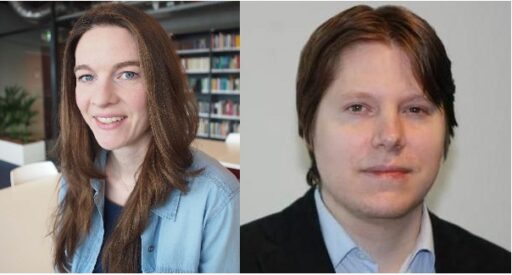Mariella Bastian & Mykola Makhortykh

Dr. Mariella Bastian is a journalism scholar whose research is closely intertwined with cultural memory studies. Currently, she is a postdoctoral researcher at the Institute for Information Law at the University of Amsterdam. She holds a PhD and Masters degree in journalism studies from TU Dortmund University (Germany). Her research interests center around media ethics and accountability, news personalization, democracy & journalism, the role of the media in dictatorships, and the algorithmic turn in cultural remembrance.
Dr. Mykola Makhortykh defended his PhD in 2017 at the University of Amsterdam. In his dissertation, he examined interactions between digital media and WWII remembrance in Eastern Europe. Currently, he is a postdoctoral researcher at the Amsterdam School for Communication Research, where his research is focused on the algorithmic personalization of news media. In his recent work, he has also explored interactions between historical memory and propaganda during the Ukraine crisis and the use of digital platforms for Holocaust remembrance. Mykola Makhortykh has other obligations on 2 July, therefore Mariella Bastian will be presenting their research.
‘The neutral point of view and the black hole of Auschwitz: Crowdsourcing the history of the Holocaust on Wikipedia’
Summary of presentation for Holocaust Studies in the Digital Age. What’s New? on 2 July 2019
In this paper, we discuss challenges and opportunities arising from the use of online platforms for collaborative history-writing about the Holocaust. The increasing use of digital media for remediating the past has attracted significant scholarly attention in the recent years (see, for instance, Garde-Hansen, Hosking and Reading (2009) and Hoskins (2016)); yet, the long-term consequences of digitalization of historical events, in particular the ones of highly traumatic nature, remain unclear. By enabling dynamic interactions in the transnational online environment, digital platforms can encourage the dialogue leading to the formation of more inclusive views on the past (Jones and Gibson 2012); however, the same platforms often facilitate the distribution of historical hoaxes and conspiracy theories increasing societal polarization and supporting populist claims (Harambam 2017).
An illustrative example of these complex interactions between collective remembrance of past traumas and digital technologies is Wikipedia, the world’s largest online encyclopedia. Built upon the neutral point of view (NPOV) principle, which encourages fair and unbiased representation of the encyclopedia’s subjects, Wikipedia offers a unique transnational space for collective history-writing (Dounaevsky 2013). Yet, the platform’s idealistic aspiration towards representing the troubled past in a neutral way is often undermined by disagreements between its authors. Consequently, instead of serving as a cross-cultural forum for negotiating the past traumas, Wikipedia often turns into a memory battlefield used by individual actors for promoting their preferred historical narratives (Rogers and Sendijarevic 2012).
So far, only a few studies (Pfanzelter 2015; Makhortykh 2018) discuss the role of Wikipedia in the context of the Holocaust memorialization; yet, all of them focus on the platform’s use for representing separate episodes of the Holocaust. In our talk, we focus on the broader consequences of the audience turn for the Holocaust studies and ask if crowdsourcing of the Holocaust history on Wikipedia can encourage the transnational dialogue about the traumatic past or, instead, create additional obstacles for it by promoting hoaxes. Specifically, we analyze how the history-writing about the Holocaust on Wikipedia is influenced by the amalgamation of cultural practices, individual agendas and platform policies and to what degree the differences in historical paradigms between Eastern and Western Europe are projected on Wikipedia.
We implement our analysis in two stages: first, we extract data about semantic relations between articles about the Holocaust and use network analysis to compare how these relations vary between Eastern (i.e. Ukrainian, Russian, Polish, and Belorussian) and Western European (i.e. English, German, and Dutch) Wikipedia versions. Specifically, we examine how specific aspects of the Holocaust are integrated into the larger WWII narrative and which of these aspects are more visible or marginalized. Based on this examination, we identify a set of cases to explore through qualitative content analysis how Wikipedia authors employ discursive strategies to collaboratively construct the Holocaust history; additionally, we discuss how Wikipedia practices and policies interact with authors’ individual views on the past.
Mariella Bastian
University of Amsterdam
m.b.bastian@uva.nl
Mykhola Makhortykh
University of Amsterdam
m.makhortykh@uva.nl
